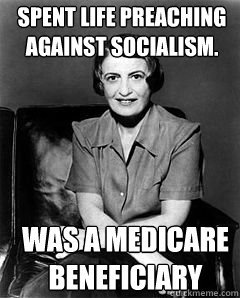- Joined
- Oct 29, 2012
- Messages
- 63
- Reaction score
- 0
I will start off by saying I'm an AnCap (Anarcho-Capitalist). This is a branch of of libertarian philosophy grounded in three main ideals: voluntary exchange, private property and the non-aggression principle. For a simple beginner's guide go here: Link
To start off, I'm against government/the state in all form, including government regulation. I am not against natural market/private regulation that that comes thru voluntary exchange and consumer's rights.
_________________________________________________
An example of market regulation:
Store owners have liability for the products they sell. If a customer is harmed by one of their products then they'll get sued, their reputation will be diminished, they'll be advertised against by competition, and competitors will take away their customer-based.
Not to mention, the store owner's insurance company is gonna want some 'standard of quality' from the store owner, if they are gonna insure his/her business. The insurance company want to reduce their liabilities and prevent possible lawsuits.
more here....
__________________________________________________
TL;DR version, government regulation is inefficient, bureaucratic, coercive, arbitrary and needlessly inflates the cost of healthcare for the average person. Get rid of all state-created(artificial) barriers to the healthcare market and the cost of providing it will go down astronomically.
In a free/ancap society every person has personal liability for their behavior, add to that reputation, insurance, social cooperation, contracts, common sense etc... This is the "invisible hand" at work; people pursuing their own interest in a non-aggressive manner, respecting property, engaging in social cooperation to accomplish goals, and taking accountability for their behavior.
That is all the regulation you need, minus the bureaucratic red-tape.
_________________________________________________
The whole debate about "is healthcare a right or a privilege" is a false dichotomy. Healthcare is a service. And like every service it cost time and money for a person to provide. We can't ignore those cost or try to regulate or mandate them out of existence.
Instead we should aim to make them as affordable as possible. Market competition does just that. Before government interference, it took a day's wage to pay for 1 YEAR'S worth of medical coverage, healthcare and insurance for low-to-no income families was available and much more efficient:
Mutual-Aid Societies for Insurance
Article: MUTUAL AIDE SOCIETIES: Origins of the Welfare State in America
Book: From Mutual Aid to the Welfare State
Article: Welfare before the Welfare State
______________________________________________________
Fraternal Societies for Medical Assistance
Short Video: How Government "Solved" the Health Care Crisis!
Article: How Government Solved the Health Care Crisis by by Roderick T. Long
_____________________________________________________
The list of reasons to oppose state regulation are endless, but are summed up in the following short videos(full list go *here):
*State Regulation* -- leads to favoritism, promoting the revolving door mentality in government-business collusion i.e. lobbying , destroys jobs for the lower classes.
, destroys jobs for the lower classes.
_____________________________________
How Cronyism is Hurting the Economy
(http://www.youtube.com/watch?v=gSgUENZ9O94)
The State Is Not Great: Legal Plunder
(http://www.youtube.com/watch?v=TJIMqwJI2uI)
Is Capitalism "Pro-Business?"
(http://www.youtube.com/watch?v=hjh7mXPfMKs)
Economic Freedom & Income Equality
(http://www.youtube.com/watch?v=8B_btJT8kzw)
The Reality of the State | Stefan Molyneux
(http://www.youtube.com/watch?v=7iA3sAPmlQE)
___________________________________________________________________
Some links covering all the common hangups:
Ancap 101 package: LINK
The Poor and Less Able: LINK
Corporation vs. Business and the Environment: LINK
Eliminating IP law: LINK
Roads: LINK
War and Defense: LINK
Law and Order: LINK
Public Schools: LINK
I know this is SDN so, this thread could go either way. I'm hoping for some good discussion.
To start off, I'm against government/the state in all form, including government regulation. I am not against natural market/private regulation that that comes thru voluntary exchange and consumer's rights.
_________________________________________________
An example of market regulation:
Store owners have liability for the products they sell. If a customer is harmed by one of their products then they'll get sued, their reputation will be diminished, they'll be advertised against by competition, and competitors will take away their customer-based.
Not to mention, the store owner's insurance company is gonna want some 'standard of quality' from the store owner, if they are gonna insure his/her business. The insurance company want to reduce their liabilities and prevent possible lawsuits.
more here....
__________________________________________________
TL;DR version, government regulation is inefficient, bureaucratic, coercive, arbitrary and needlessly inflates the cost of healthcare for the average person. Get rid of all state-created(artificial) barriers to the healthcare market and the cost of providing it will go down astronomically.
In a free/ancap society every person has personal liability for their behavior, add to that reputation, insurance, social cooperation, contracts, common sense etc... This is the "invisible hand" at work; people pursuing their own interest in a non-aggressive manner, respecting property, engaging in social cooperation to accomplish goals, and taking accountability for their behavior.
That is all the regulation you need, minus the bureaucratic red-tape.
_________________________________________________
The whole debate about "is healthcare a right or a privilege" is a false dichotomy. Healthcare is a service. And like every service it cost time and money for a person to provide. We can't ignore those cost or try to regulate or mandate them out of existence.
Instead we should aim to make them as affordable as possible. Market competition does just that. Before government interference, it took a day's wage to pay for 1 YEAR'S worth of medical coverage, healthcare and insurance for low-to-no income families was available and much more efficient:
Mutual-Aid Societies for Insurance

Article: MUTUAL AIDE SOCIETIES: Origins of the Welfare State in America
Book: From Mutual Aid to the Welfare State
Article: Welfare before the Welfare State
______________________________________________________
Fraternal Societies for Medical Assistance

Short Video: How Government "Solved" the Health Care Crisis!
Article: How Government Solved the Health Care Crisis by by Roderick T. Long
_____________________________________________________
The list of reasons to oppose state regulation are endless, but are summed up in the following short videos(full list go *here):
*State Regulation* -- leads to favoritism, promoting the revolving door mentality in government-business collusion i.e. lobbying
 , destroys jobs for the lower classes.
, destroys jobs for the lower classes._____________________________________
How Cronyism is Hurting the Economy
(http://www.youtube.com/watch?v=gSgUENZ9O94)
The State Is Not Great: Legal Plunder
(http://www.youtube.com/watch?v=TJIMqwJI2uI)
Is Capitalism "Pro-Business?"
(http://www.youtube.com/watch?v=hjh7mXPfMKs)
Economic Freedom & Income Equality
(http://www.youtube.com/watch?v=8B_btJT8kzw)
The Reality of the State | Stefan Molyneux
(http://www.youtube.com/watch?v=7iA3sAPmlQE)
___________________________________________________________________
Some links covering all the common hangups:

Ancap 101 package: LINK
The Poor and Less Able: LINK
Corporation vs. Business and the Environment: LINK
Eliminating IP law: LINK
Roads: LINK
War and Defense: LINK
Law and Order: LINK
Public Schools: LINK
I know this is SDN so, this thread could go either way. I'm hoping for some good discussion.
Last edited:



